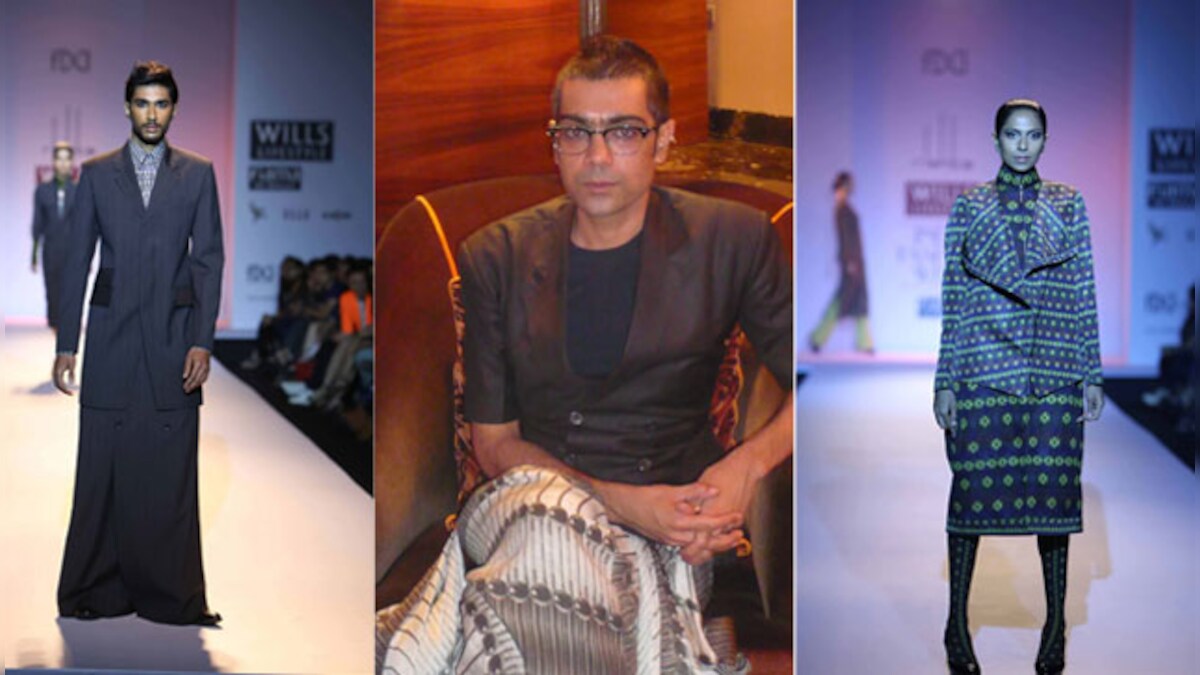Saluja had previously lived and worked in New York, for celebrity stylist Patricia Fields who had several transgenders working for her.
“Gender binaries– the ardhanareshwar– was part of our cultural dialogue all along”
Arjun Saluja’s Rishta has been putting celebrities in elegant structure-meets-fluid clothing to great admiration
When Arjun Sajula launched his label Rishta in India in 2004, little did he know he would be heralding a new chapter in Indian fashion as well as a global trend. Saluja’s Rishta is best known for his androgynous shapes, a remarkably tasteful blend of structure and drape, where men’s and women’s clothing blend into one amazing outfit.
Saluja had previously lived and worked in New York, for celebrity stylist Patricia Fields who had several transgenders working for her. “I was hanging out with a lot of people who redefined gender, and it was revolutionary. Previously my interactions with transgenders was always as ‘the other’, but now I was working alongside them I realised gender and labelling was not an issue. I started thinking of a label without a label, I started thinking of non gender. The first trouser I designed was a hybrid between pants and a skirt,” Saluja, now 48, recalls.
This was in the year 2002. New York was broken in the aftermath of 9/11, and despite his amazing degree from the Philadelphia College of Textiles and Design, and several summer courses at Parsons, setting up a label there proved challenging. Saluja and his novel ideas of non-gender moved back to India.
It was novel alright. Gender-bending dressing would come into mainstream fashion only a decade later, especially when Alessandro Michele was hired by Gucci in 2015. Prior to this, you could perhaps see some Indian designers put their men or women in dhoti pants, but gender was almost always kept out of the narrative.
“New York was flooded with ideas of gender binaries. But in India we had the masculinity-femininity ardhanareshwar too. It was part of our cultural dialogue all along. That process and emotion was part of my subconscious triggers all along,” Saluja avers. “We take our silhouettes for granted: our sherwani, our sari, the Aligarhi pyjama, which is essentially a drop-crotch trouser.” Saluja goes on to add: “A dhoti, for example, is worn by a farmer to work in, bathe in, pray in, sleep in. The politician wears a dhoti as a political tool. The middle-class man wears it if it’s in fashion. We can come up with a new language, like a bush shirt meets a dhoti.”
Saluja’s tailoring is rare for an Indian designer. Few in the country– perhaps other than Wendell Rodricks and Rajesh Pratap Singh– rely solely on a well-tailored garment, fully giving up print or embroidery as embellishment. Besides, all three exhibit a unique vibe through their aesthetics. “But of course we are a tailoring country!” Saluja disagrees. “Look at our bandhgalas or sherwanis. Or the pyjama. A friend had given me a Nizami sherwani once and I ripped it open to see how it was made. We are conditioned to not look beyond textile and embroidery, but there is so much more to India than that. I worked in a menswear store that had pieces from Brioni, Armani and McQueen, and I learned how these garments were tailored.”
Saluja’s collections dip into literature too. One androgynous collection was inspired by a trans character in Jeet Thayil’s Narcopolis. Another was inspired by female construction workers who build magnificent homes but are nomadic labourers themselves. It was called ‘No Ground Beneath Her Feet’, borrowing from Salman Rushdie. “It was questioning capitalism in a way, the woman who builds the house and the woman who lives in it have starkly different lives.”
His collections are always in monochromes. But a 2020 line called ‘Sifar’ was a notable exception. “I started working with artisans who collected waste onions and made dyes out of it. Onion is one of the most political vegetables in the country, it’s dropped governments. I wanted to reflect on this zeitgeist, to take this and make it contemporary,” he explains.
Saluja’s Rishta retails at Ogaan and Ensemble, as well as some reputed stores across India and in Kuwait. His focus, he says, is to build his ecommerce to be a more sustainable business model. “A lot of work still comes in via Instagram,” he says. “But I would love to have my own conceptual fashion store soon.”
For now, his clothes are found on the back from truly disruptive dressers: Arjun Kapoor, Ayushman Khurrana and Vijay Varma. “Celebrities have to challenges ideas like Rishta does, or else it doesn’t matter,” he says.
Read all the
Latest News
,
Trending News
,
Cricket News
,
Bollywood News
,
India News
and
Entertainment News
here. Follow us on
Facebook
,
Twitter
and
Instagram
.

